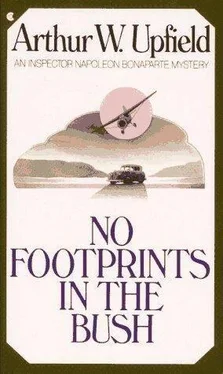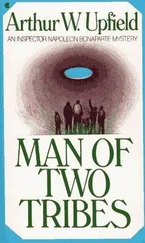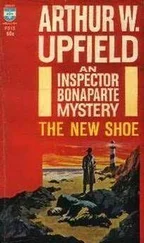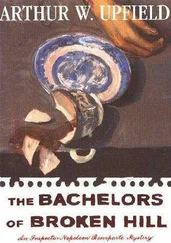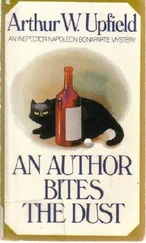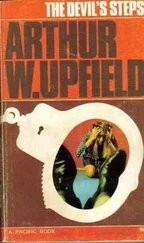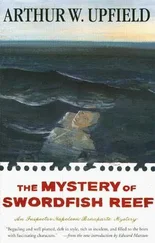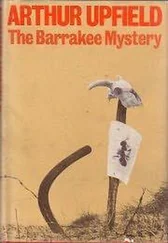Arthur Upfield - No footprints in the bush
Здесь есть возможность читать онлайн «Arthur Upfield - No footprints in the bush» весь текст электронной книги совершенно бесплатно (целиком полную версию без сокращений). В некоторых случаях можно слушать аудио, скачать через торрент в формате fb2 и присутствует краткое содержание. Жанр: Классический детектив, на английском языке. Описание произведения, (предисловие) а так же отзывы посетителей доступны на портале библиотеки ЛибКат.
- Название:No footprints in the bush
- Автор:
- Жанр:
- Год:неизвестен
- ISBN:нет данных
- Рейтинг книги:5 / 5. Голосов: 1
-
Избранное:Добавить в избранное
- Отзывы:
-
Ваша оценка:
- 100
- 1
- 2
- 3
- 4
- 5
No footprints in the bush: краткое содержание, описание и аннотация
Предлагаем к чтению аннотацию, описание, краткое содержание или предисловие (зависит от того, что написал сам автор книги «No footprints in the bush»). Если вы не нашли необходимую информацию о книге — напишите в комментариях, мы постараемся отыскать её.
No footprints in the bush — читать онлайн бесплатно полную книгу (весь текст) целиком
Ниже представлен текст книги, разбитый по страницам. Система сохранения места последней прочитанной страницы, позволяет с удобством читать онлайн бесплатно книгу «No footprints in the bush», без необходимости каждый раз заново искать на чём Вы остановились. Поставьте закладку, и сможете в любой момент перейти на страницу, на которой закончили чтение.
Интервал:
Закладка:
“Blast you! I’m being as frank as I intend to be with a damned, interfering, half -caste detective. And now I’m going to bed.”
“Very well, then,” Bony said quickly, and McPherson made no move to retire to bed. “Tell me why you refused to launch a prosecution six years ago, against the person who forged your signature to cheques amounting to close upon three thousand pounds.”
“I refuse to say. It’s my business. It was my money. I’m going to bed.”
The squatter now stood up. Bony remained seated. His right hand went out to take the fourth cigarette of the five he had made. He found this one to have a hole in the paper and so discarded it for the last.
“I must point out that the murder of Sergeant Errey falls into a different category to those misdemeanours you name annoyances,” Bony proceeded, whilst steadily regarding the standing squatter. “By the way, Sergeant Errey’s small attache case was stolen from my swag.”
“When?” barked McPherson.
“After my arrival here, I think.”
“Rot! Who would take anything from your swag?” McPherson demanded-and sat down.
“I placed the attache case inside the swag, before Burning Water and I left the cabbage-tree camp. I made it quite secure. When I unrolled the swag in my room this evening it was not there, but all my other possessions, such small objects as shaving brush, hairbrush and comb, were exactly as I had placed them. Burning Water carried the swag down from the hills and across the plain, as I required freedom to use my pistol arm. After his people met us one of them carried it and left it propped against the rear wall of this building. Who brought it to my room, d’you know?”
“I don’t. The groom, a black, took it to the kitchen. One of the two maids would certainly take it to your room. I didn’t steal the damn thing-if it were stolen and didn’t fall from the swag.”
“I am not accusing you, my host. Its theft is not so very important, for after all I like to gather my own evidence in my own way. You mentioned that Mit-ji was an old man suspected of communicating with the Illprinka blacks. Are there any other Wantella men so suspected?”
“I’ve had my eye on a fellow named Itcheroo.”
“Ah! Perhaps it can be accounted to Itcheroo that the pilot knew of Mit-ji’s arrest, and now would know I witnessed his bombing of the car, that I retrieved a flat object belonging to Errey, and that I was here when he flew over the house this evening. I must interview this dangerous Itcheroo, and then we’ll go off to bed.”
Bonaparte had done all he could to obtain the confidence and the assistance of the man still angrily glaring at him; and now had arrived his predetermined time to break McPherson’s opposition.
“I understand that you never married,” he said. “I understand, too, that Miss McPherson is the only living relative. Your opinion of her sterling qualities is warmly supported by me. Who was the visitor here who left that extraordinarily vivid dressing-grown and the blue doeskin slippers?”
McPherson’s face became as grey as his moustache. Bony saw panic leap into his eyes, noted how the hand holding the pipe was faintly trembling. But the squatter’s voice was wonderfully controlled.
“He was a man who came up from Melbourne to write a book,” the harsh voice barked. “I tell you I’m sick of this conversation, this cross-examination. I’m going to bed.”
“In normal circumstances I would not be so persistent,” Bony said, and there was no buoyancy in his voice. “I am a man hating always to be hurried. I like to proceed with an investigation in my own plodding manner, declining assistance from anyone, resenting assistance if offered. I know this much, already. The man you say came here from Melbourne to write a book was a half-caste like me.
“In normal circumstances, I would regard the theft of Errey’s attache case from my swag as in no way annoying. But, Mr McPherson, the present circumstances are not normal. No, not when a man drops bombs from an aeroplane and flies over a house at night to dropa treacle tin containing a threatening message. Here it is.”
With his right hand Bony pressed the end of the fifth cigarette into the emu-egg ash tray, and with the left proffered the squatter the piece of paper he had found among the sand inside the treacle tin.
McPherson’s face became grey. He stared into Bony’s eyes, and automatically his right hand accepted the paper. He read aloud the message, written in a small and neat hand.
“You had better give in and retire. I am becoming impatient. If you don’t surrender I shall strike again and again, and I shall strike harder.”
The paper planed down to the surface of the table desk, and Bony picked it up and placed it inside a slim pocket-book. For twenty seconds McPherson stared at him before saying:
“You win. The aeroplane pilot is my natural son.”
Chapter Seven
Pages of History
THE McPherson-so referred to by Chief Burning Water and by all the aborigines on the station-helped himself liberally and pushed the decanter and water jug towards Bony.
“I don’t like being beaten,” he said thickly.
“Defeat is a school in which truth always grows strong,” Bony told him. “I cannot recall who wrote that, but it is apt. Believe me, I don’t regard myself as a victor. I held a fifth ace in that message, and another good ace in the dressing-gown and slippers. You see, I know myself, and I know my kind. This airman says he will strike again and again, and I suppose he will. Whatd’youthink about him?”
“Yes, Rex will carry out his threats,” replied McPherson. “I fail to understand him, and yet somehow I do understand him a little. Like to hear about him?”
“Naturally.”
The squatter gulped his drink, and with the tobacco cutter began to prepare loading for his pipe. He was calm now after a period of mental crisis. His arrogance had vanished. His body had lost its former stiffness in action. He seemed smaller than he actually was. Bony rolled his sixth cigarette.
“I must be just to myself before I tell you about Rex,” McPherson stated in preface. “I want you to understand me, so if you find me abnormal I can be more just to my lad. You see, I have never had the opportunities of gaining the outlook to life possessed by you, and by men who have had the sharp edges rubbed off them by association with competitors. Even that idea I have got from a book.
“I blame my mother for a little and my father for a lot. He was, like his forebears, through but just in all things. She was virile and courageous, self-dependent and frugal. I think I know more about their early background than I know of my own, through the books they brought with them.
“They were of the same age, and were I to speak to you in their tongue you probably wouldn’t understand me. They were young, both well under thirty, when they came here, having pushed on ahead of the settlement extending westward to the Diamantina. How they ever stuck it I don’t know; and how my father came to leave me close on a hundred thousand pounds beside this property I fail to understand. They don’t breed men and women like them nowadays.
“Picture them! They came with all their possessions loaded on to three bullock wagons, one of which was driven by that old man you saw tending to the lawn sprinklers. It happened to be a good season but that was the only thing in their favour. My sister was a baby in arms, and my mother was carrying me. When the baby was sick she doctored her; when I was born the lubras tended my mother.
“My father always got on fairly well with the blacks, and I think that was because of his sense of justice. He compensated them for the use of their land, as, he told me, Batman did down in Victoria. My mother found no difficulty in making friends with the lubras, and so, despite setbacks, they and those with them became established, the others who came with them being the three bullock drivers.
Читать дальшеИнтервал:
Закладка:
Похожие книги на «No footprints in the bush»
Представляем Вашему вниманию похожие книги на «No footprints in the bush» списком для выбора. Мы отобрали схожую по названию и смыслу литературу в надежде предоставить читателям больше вариантов отыскать новые, интересные, ещё непрочитанные произведения.
Обсуждение, отзывы о книге «No footprints in the bush» и просто собственные мнения читателей. Оставьте ваши комментарии, напишите, что Вы думаете о произведении, его смысле или главных героях. Укажите что конкретно понравилось, а что нет, и почему Вы так считаете.
